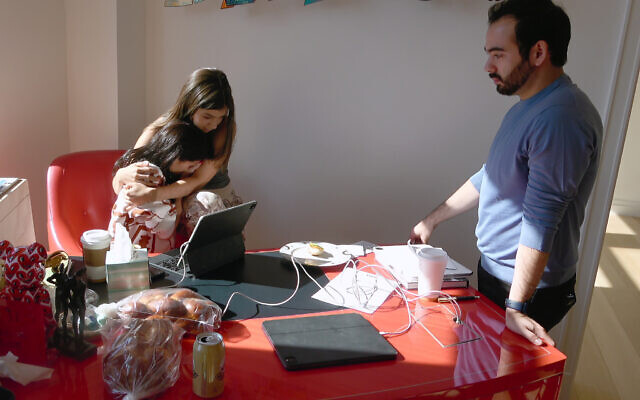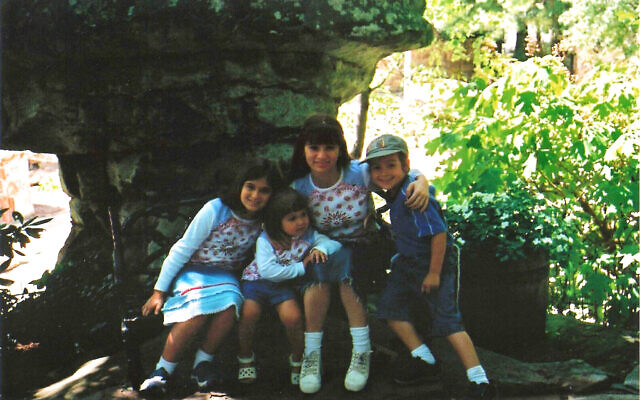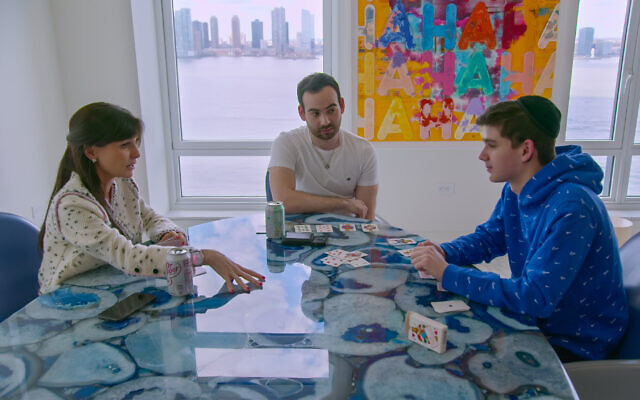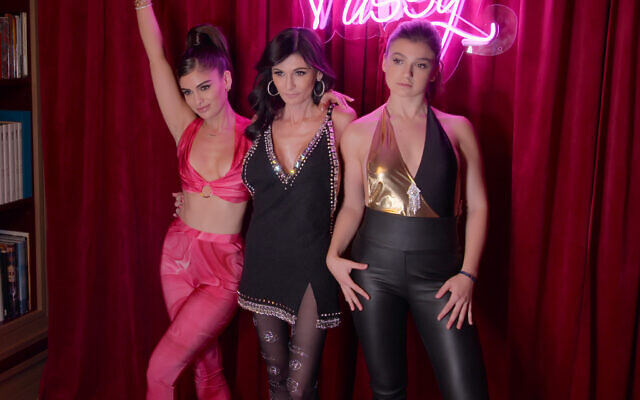Buckle Up: The second season of the Netflix reality series “My Unorthodox Life” has been a bumpy ride.
Since the show premiered on the streaming platform last year, a lot has changed in the Hart family. When season one wrapped, family patriarch Julia Hart was happily married to her second husband, Silvio Scaglia, and Scaglia’s CEO and half-owner of Elite World Group — or so she thought. Their eldest daughter, Batsheva, was celebrating nine years of marriage with her husband, Ben.
Fast forward to February 2022, just as filming for the second season begins, and Hart is briefly fired midway through Messy – and still ongoing – divorce Scaglia and told that he did not control half the company, while Batsheva and Ben decided to leave different ways After realizing that their attitudes towards religion are no longer aligned.
Despite feeling like she had hit her “lowest point” and being “humiliated in the press,” Hart said she decided not to turn off the cameras and cancel the season, which premiered on Netflix on Friday. hits the
Hart told The Times of Israel in a recent phone interview from New York that when she first received news of her firing, she thought: “I’m not getting off the floor, I just want to hide and disappear and Want to fall off the ground and just don’t exist – this pain is too much.
“And then I said to myself, ‘Julia Hart, you pick yourself up off this floor, because if you fall apart, if you fall apart, he wins,'” she recalled. Hart said she wants to make sure her story is available to inspire anyone else in similar circumstances. “That’s why I didn’t stop doing films. Because I am living proof that a story can change your life.
For those who missed the first season Or the nonstop tabloid coverage of the now famous family, “My Unconventional Life” centers on Julia Hart, now 50, who lived an Orthodox Jewish lifestyle in Monsey, New York, until her marriage a decade ago. had not gone away. Religious observance and its community.
The show follows Hart and her four children – Batsheva, Shlomo, Miriam and Aron – through her path of reinvention as a fashion executive, her marriage to billionaire entrepreneur Scaglia, and the family’s gradual transformation.
The much-talked-about show’s new season is working through an amicable split with Hart and Scaglia making tabloid headlines about the ongoing divorce drama with a sense of foreboding hanging in the air for anyone. The flood has seen anything but amicable. , And within the first episode, things take a turn as Scaglia fires Hart from the company and the battle lines are drawn.
The entire second season often feels like a carefully curated showcase of Hart’s defense – both in the courtroom and in public opinion – of the many ongoing legal battles against Scaglia. While very little of his side is presented in the show, Netflix has been careful to note certain developments and disclaimers, including Delaware. court ruling In August it was found that Julia owned only 49.9995957% of the company’s shares, although Scaglia had assured her that she was an equal owner.

Miriam and Shlomo Hart comfort Julia Hart in an episode of the second season of ‘My Unorthodox Life’. (Netflix)
In the six months since filming was completed for Season 2, little has been resolved in the divorce battle and the battle for control of Elite World Group.
“Right now I have appealed in Delaware, I have a defamation suit against him and a fraud suit against him,” Hart said this week. “I feel very confident about my fraud lawsuit. But in the meantime, since we’re fighting for control of the EWG and I don’t have access to it, I realize I don’t want to sit still.
Hart said in the meantime she is in the R&D phase of an initiative seen on the show called “Hart Sphere,” as well as organizing an event based on matching VC funders with female-led startups, and has already is launching. famous line Of shapewear.
‘Reliving the trauma’
The series’ first season was met with hostility from much of the Orthodox Jewish community, which angry and rejected portrayal of Hart’s parochial lifestyle, while some questioned The veracity of their claims regarding their experience and their previous level of adherence.
“It was extremely difficult coming out of the first season, because it was like reliving the trauma,” Hart said. “To be told that what happened to you didn’t happen to you is very painful.”

Julia Hart with her children Batsheva, Miriam and Shlomo in Atlanta in 2002. (courtesy elite world group)
Hart claimed that “Most of the attacks were made by people who never actually saw the whole show. Because if they actually saw the whole show, they would see what I think is beautiful in Judaism.” I will show
She said she has also received an “outpouring of support” from some elements of the Jewish community, including unexpected support from some Hasidic Jews.
In the second season, Hart reveals that his sister, Chana – the only one of his seven siblings who kept in touch with him after he left the community, and even appeared in the show’s first season – has also Decided to cut ties completely.
“She told me the school called her and threatened to remove her children from the school if she didn’t break contact with me,” Hart told The Times of Israel. “She told me that her friends in her community stopped talking to her. She didn’t want to be an outcast.
On the other hand, Hart’s ex-husband, Yosef Hendler, and his new wife, Aliza Schulhoff, appear to have remained on good terms, and have agreed to appear on the show once again, despite potential criticism at home.
“They understand what I’m trying to do … They want to show that you can be religious and still be a part of the outside world,” Hart said. “They are not mutually exclusive.”
And while Hart still refers to her exit from her first marriage as an “escape” and laments being “controlled” by a man, she bears no ill will toward Handler.
“It’s not his fault – he was just as much a victim as I was,” Hart said. “We were forced into certain roles by the laws that existed in that world… I was supposed to be under that. He was the one to make sure I was fully covered.
Agunote on screen
Critics of Hart’s portrayal of Orthodox Judaism will likely include some elements from Season 2, as well as a scene where he meets with an Orthodox Jew. workers Working on the issue of “Agunot”, chained women unable to obtain a Jewish writ of divorce.
“In my world, this very painful condition is called ‘aguna,'” says Hart on the show. A woman whose husband refuses to divorce her, “is left alone for the rest of her life until he gives her one.” ReceivedAnd she can’t remarry, and she has nobody, and she’s second class.
While the topic is a touchy one, most of the loudest critical voices on the issue come from within the community. Using Hart’s show to highlight the issue – and downplay some of its complications – as another example of “archaic Jewish laws” is likely to ruffle some feathers.
In contrast to Julia and Scaglia’s chaotic split, Batsheva and her ex-husband, Ben Weinstein, have reached an amicable decision to part ways. In the show, Batsheva says the pair married when they were both young and religious, but their views on parenting led to a difference.
“We just got married at 19, we both went from ultra-religious to Modern Orthodox, and then at 28 we both wanted different futures – his vision being a Modern Orthodox family and full Shabbat keeping and Had to eat full kosher — and that’s just not what I want,” she said.
“And I realized that for a while, I was doing everything just out of respect for him. I’m not really religious anymore, I don’t want to raise a family like this… Why do I ask him to change what I want, because I don’t want him to ask me to change too.
While both Batsheva and Shlomo seem to have moved further away from the ritual they organized in season one, Eran, the youngest member of the family, seems to be moving in the opposite direction.

Julia Hart talks with Shlomo (center) and Aron (right) in an episode of season two of “My Unorthodox Life.” (Netflix)
At the end of season one, Aaron – who splits his time between his parents – was seen embracing his new gender-integrated modern conservative high school in New Jersey. But now he is moving toward a more observant lifestyle and wants to switch to a full-time yeshiva that focuses largely on Jewish studies and offers only minimal secular education.
Surprisingly Hart is against any such move.
“I want him to have a 21st century education, and he’s not going to attend yeshiva, that’s just a fact,” she said. Hart notes that by next year, after Aron turns 17, she won’t be in the way of her choice. “I just want him to have the tools. That’s all. I don’t want to force him. I don’t want to change the course of his life. I want him to have the tools.
In some of the show’s most poignant scenes, Aron passionately argues that his Jewish upbringing is what brings him joy in life, and that he aims to become a rebbe, or teacher of Jewish studies, a path for which no Secular education is not required.
Hart said she would support Aron no matter what he does, and she just wishes she had more options available to her.
“If he doesn’t have a college degree, if he doesn’t have an education, it’s going to be very difficult to do any job other than being a rebel,” she said. “That’s what I’m trying to avoid. I want her to have options. Nothing more.”
